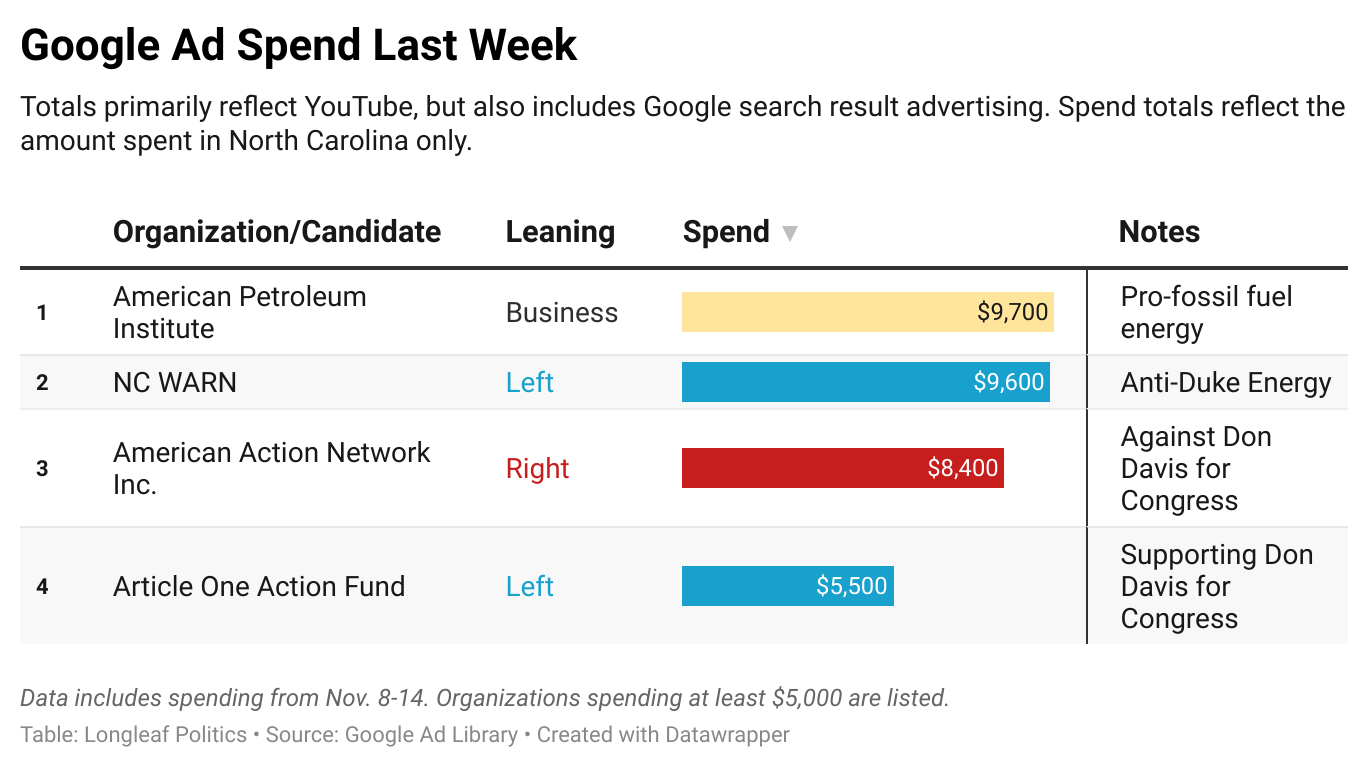6 things I'd love to see Dave Boliek audit
Here are the places a real audit could answer what the glossy reports don’t.
Every time I get a notification in my inbox that the Office of the State Auditor has released a new report, I feel a little tingle inside. OK, maybe that’s a bit overdramatic, but under new State Auditor Dave Boliek, the office has already made a ton of news.
And there’s certainly plenty in North Carolina worth an audit. It didn’t take me long to come up with this list of six areas I’d love to see Boliek tackle.
When I talk about an “audit,” I don’t mean punishment or a political hit job. A good audit asks three simple questions:
Is this program operating the way the law says it should?
Is it actually achieving valid goals?
Are taxpayers’ dollars being protected, not wasted or abused?
What follows is my short list of where I’d like to see that kind of work done next. It’s a mix: some hot, topical issues, and some quieter areas where state spending has quietly exploded in recent years.
These are the places where a serious, public audit could answer questions that existing reports and consultant studies just don’t touch.
1. H-1B visa use by public agencies
Big companies like IBM and Red Hat are the biggest users of the H-1B visa program, but a significant number of public bodies — think school boards, universities and local governments — are bringing in folks as well. I’m glad North Carolina can attract global talent, but I also think taxpayers deserve a clear, statewide picture of how our public institutions are using the H-1B program.
We already know it’s not a niche issue. School districts like Wayne, Halifax and Charlotte-Mecklenburg have leaned heavily on H-1B teachers. Universities and teaching hospitals bring in professors, researchers and clinical staff on H-1B visas. Even core public agencies — city governments, housing authorities, and state departments — show up in federal H-1B data for roles like engineers, IT security, and planners.
But all of that is pieced together from scattered databases and individual institutions’ websites. What we don’t have is a single, honest accounting that connects the dots.
Existing federal data shows us what agencies are using the program. What an audit could uncover is what we are paying in legal fees, recruiters, and associated costs, and compare those costs to recruiting and training North Carolina workers.
It could also match up the visas with actual jobs, and show us if H-1Bs are concentrated in true shortage areas or sprinkled across roles we ought to be able to fill locally if the pay and conditions were better.
2. SNAP benefits: Are we actually fighting hunger?
SNAP, better known as food stamps, is a mind-bogglingly large safety net program in our state. Roughly one in eight North Carolinians receives SNAP benefits at some point.
Boliek’s office just finished a performance review showing tens of millions of dollars in delayed payments over just a few years, but it didn’t answer more basic questions.
How long does the average participant use the SNAP program? How much of the money goes to full-service groceries versus high-risk outlets like gas stations? At the national level, one of the biggest uses of food stamp benefits is soda. Is that true in North Carolina?
The goal wouldn’t be to shame families who use SNAP. It would be to protect them — and the taxpayers who fund it — by making sure the system is doing what North Carolinians think it’s doing.
3. Preschool and early childhood: From big promises to real seats
Both parties love to tout “historic investments” in early childhood. We’ve poured hundreds of millions of dollars into NC Pre-K and child-care subsidies in just the last few budget cycles.
We can see appropriations. We can see official enrollment counts. What we can’t see, clearly, is the actual gap: How big the waitlist really is, where those kids live, and which counties are turning new dollars into real seats instead of paperwork.
That’s what I’d want an audit to nail down. How many children are waiting for NC Pre-K or child-care subsidies right now, broken down by county and how long they’ve been stuck there? Which counties saw waitlists shrink after funding increases, and which saw them grow anyway? When new money went out, where did it actually translate into more classrooms and higher teacher pay — and where did it mostly disappear into central offices and overhead? An honest audit could finally show which local models are working.
4. Opportunity Scholarships: Protecting a program I want to see succeed
I’m a strong supporter of Opportunity Scholarships. I want families — especially working- and middle-class families — to have real options when their local school isn’t working.
Precisely because I want this program to endure, I want it scrutinized more deeply than it has been so far.
We already know the basics: tens of thousands of students, hundreds of millions of dollars, and a rapid expansion that will only grow in the next few years. We’ve also seen analyses suggesting some schools may have been paid for more voucher students than they appear to enroll.
And then there’s the reporting by longtime education journalist Ann Doss Helms. She spent months trying to track down a private school that had received hundreds of thousands in voucher money over a decade. For a long time, she couldn’t find a functioning campus or students to match the payments. When a new address finally turned up, she found only a small group of students and lingering questions about governance and oversight.
An audit could spot phantom and unstable schools and recommend tighter guardrails. Where problems are found, an audit can lay out concrete steps — better attendance reporting, stronger financial reviews, quicker suspensions — that keep bad actors from tainting the broader program.
5. Medicaid transformation and expansion: Owning the shortfall
Medicaid is an overwhelmingly complicated program already. On top of that, North Carolina layered on two huge changes at once: transforming the program into managed care and expanding eligibility to hundreds of thousands of adults.
Medicaid expansion has now enrolled more than 600,000 people in our state. That is a major policy shift with real human consequences. It has also come with a big, messy budget surprise — costs coming in hundreds of millions of dollars above early estimates, prompting rebasing fights, emergency infusions of cash, and rate cuts to hospitals and doctors.
Right now, every side has its own story about why that happened. DHHS blames underfunding. Legislators blame bad projections. Managed-care companies point to inflation and sicker-than-expected patients.
What we don’t have is a neutral, detailed, public accounting of where the numbers actually went off the rails.
Expansion and transformation were bipartisan choices. An audit here wouldn’t be about second-guessing that decision so much as making sure we understand what actually happened before we lock in the next decade of policy.
6. The NC Education Lottery: Beyond the sales pitch
The state lottery has been around long enough that a whole generation of North Carolinians barely remembers what it was like before.
From the start, lawmakers and lottery ads told voters this would be extra money for education. Since then, the state has layered on a complex mix of financial audits, consultant reports, and legislative studies.
For most of the lottery’s life, the recurring “performance audits” have come from the same Wisconsin-based industry consulting firm. Those reports focus heavily on sales, game mix, and how to squeeze more revenue out of players — even recommending more aggressive advertising and higher-dollar scratch-offs.
That’s useful for the lottery as a business. It’s a lot less useful for taxpayers trying to understand what the lottery has actually done for schools.
A comprehensive audit could look at the whole lifespan, not just recent years. Starting with the 2005 lottery law, trace how much of total lottery revenue truly added to education funding and how.
The private consultants have already told the lottery how to sell more tickets. The people who buy those tickets deserve an equally blunt assessment of what the “education” part of the Education Lottery has really meant.
At a premium
Quick hits
Some readers thought my column on possible Border Patrol operations in Charlotte meant I was soft on immigration enforcement. I’m not. Enforcing immigration law — especially against people here illegally who commit violent crimes — is the baseline. We should want strong enforcement, done the right way. Read free with gift link: North Carolina shouldn’t have to choose between open borders and unmarked vans
Chapel Hill–Carrboro’s school board openly voted to ignore the Parents’ Bill of Rights — then bragged about it on camera. Now the legislature has to enforce the law without turning them into heroes on progressive turf. In my other column this week, I argue the smartest move isn’t a sledgehammer from Raleigh, but a steady campaign in the court of public opinion that forces Democrats to own this radical experiment in the schools. Read it here with gift link: A North Carolina school board wants to be martyrs. Don’t let them be
Top spenders on social media last week
Question of the week
Last week, I asked you about the size of the blue wave coming. A plurality (38%) of you agreed with me that a wave was coming, but with only moderate losses.





Schools and healthcare funding are the two largest budget items for the NC legislature, they should be aggressively audited.
The fact his office's audit shows less than 5000 students at UNC-Asheville with tuition only contributing 8% to the school's revenue is a big red flag. The school is a taxpayer subsidized albatross. But you have to dig through the audit to see that. It shouldn't be that hard to see waste. It needs to be more prominent.
I would also like to see a full scale audit on state sponsored higher education from the NC Legislature all the way to each school to the student. I believe it would cause the collapse of several schools.
Another in-depth audit into the NC medical board to see where Medicaid is spent and how is also important. There hasn't been one since 2023-before Medicaid Expansion really hit.
We need to stay aggressive on auditing where taxpayer money is going.
Waste not, want not.
I'd really like to see the Mining Commission and the Raleigh-Durham Airport audited. There is fraud in there somewhere with Wake Stone / aka Vulcan Materials.